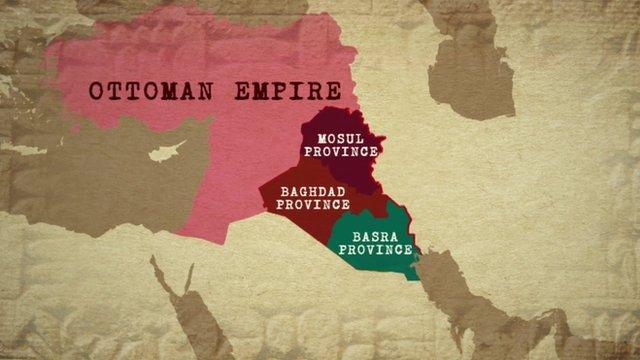UK outlaws Isis, the militant group behind Iraqi attacks
- Published
- comments
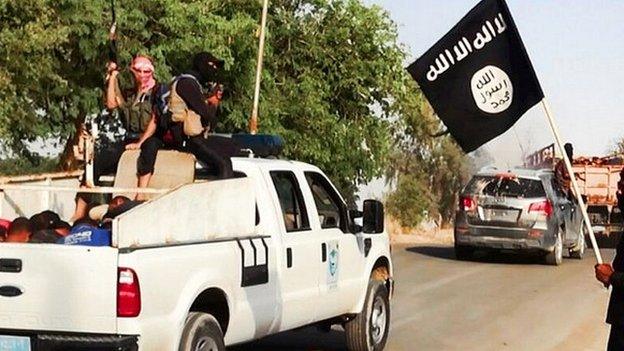
An image appearing to show militants from the Islamic State of Iraq and the Levant (Isis) with truckloads of captured Iraqi soldiers (sourced by Associated Press but not verified)
The Islamist militant group that has seized control of parts of Iraq has been outlawed in the UK.
The Home Office said it would be a criminal offence to associate with or give financial backing to the Islamic State of Iraq and the Levant (Isis).
The UK has ruled out a role in any possible military action but may give other support to the Iraqi government.
Nick Clegg has warned that the turmoil in Iraq and Syria is a "very direct threat" to the safety of UK citizens.
The deputy prime minister said the UK would not provide "active frontline military resources" to support any action taken against Isis forces but added that the UK would not stand in the way of "well judged, well targeted action to assert some semblance of order in Iraq".
Foreign Secretary William Hague has made a statement to Parliament on events in Iraq after recent territorial advances by the Sunni-dominated Isis group.
'Useful weapon'
He has also spoken to his counterpart in Iran about the crisis, amid reports that Tehran is considering military support to the Shia-led administration in Iraq.
William Hague: "We have made it clear that there are no plans for military intervention by the UK"
Meanwhile, the Home Office has proscribed Isis and four other groups, which it said had been involved in acts of terrorism in Syria.
"Proscription is a useful weapon in the armoury at the disposal of the government, police and security service to disrupt terrorist activity and protect the UK," said Home Office Minister James Brokenshire.
"Today we have laid an order which will proscribe five groups with links to Syria.
"Four other groups operating in Syria are already proscribed. This means being a member of or supporting these organisations will be a criminal offence."
The other groups being outlawed are:
Turkiye Halk Kurtulus Partisi-Cephesi (THKP-C)
Kateeba al-Kawthar (KaK)
Abdallah Azzam Brigades, including the Ziyad al-Jarrah Battalions (AAB/ZJB)
Popular Front for the Liberation of Palestine-General Command (PFLP-GC)
Speaking at his monthly news conference, Mr Clegg said the conflicts in Syria and Iraq were clearly linked.
"The horrific crucible of violence in this bloody civil war in Syria undoubtedly is acting as a generator of violence and extremism which not only spills over to other countries in the region but also unfortunately poses a very direct threat to the safety of British citizens on the streets of Britain too," he said.
The risk of Islamist Jihadists trained in Syria returning to the UK intent on violence was the "number one security issue" facing the government, he added.
'No appetite'
Mr Hague told MPs that up to 400 British citizens were fighting in Syria and Iraq.
Although events in Iraq were a "serious threat" to international peace and security and the US was considering a range of options, he said the UK would not take part in any military action.
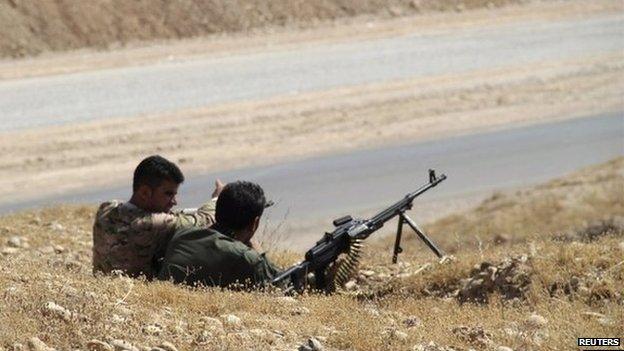
Members of the Kurdish security forces have clashed with militant group Isis
The UK's focus, he said, was on supporting a "democratic and sovereign Iraq" to resist the threats it faced and "to stop the spread of terrorism in Iraq and the region".
The UK would provide assistance "where appropriate and possible", including "counter-terrorism expertise", as well providing humanitarian aid and encouraging "political unity" among Shia, Sunni and Kurdish groups.
The BBC News Channel's chief political correspondent Norman Smith said Mr Hague had "closed the door" to any UK involvement in military action in Iraq, mindful of the government's failure to get the backing of MPs for potential air strikes in Syria last year.
However, Norman Smith said he understood a handful of UK military advisers may be sent to Iraq to provide technical support.
'Folly'
For Labour, shadow foreign secretary Douglas Alexander said he welcomed the assurance that military action was not being contemplated, adding that it would be "folly" to repeat past mistakes.
"For most British people including many of us who supported the action at the time, the fears of those opposed to the [2003] intervention have been vindicated by subsequent events," he said.
"It is futile to deny that subsequent history as surely as it would be folly to repeat it."
Former Lib Dem leader Sir Menzies Campbell said there was "absolutely no appetite" in Parliament for direct military intervention.
While the 2003 Iraq invasion was not the "sole cause" of the current violence in the country, he said it had made a "significant contribution" to the turmoil being witnessed.
Rory Stewart, the new Conservative chair of the Commons defence committee, said the situation in Iraq was extremely complicated and the international community should be "incredibly cautious" about doing anything that might risk inflaming sectarian tensions.
- Published16 June 2014
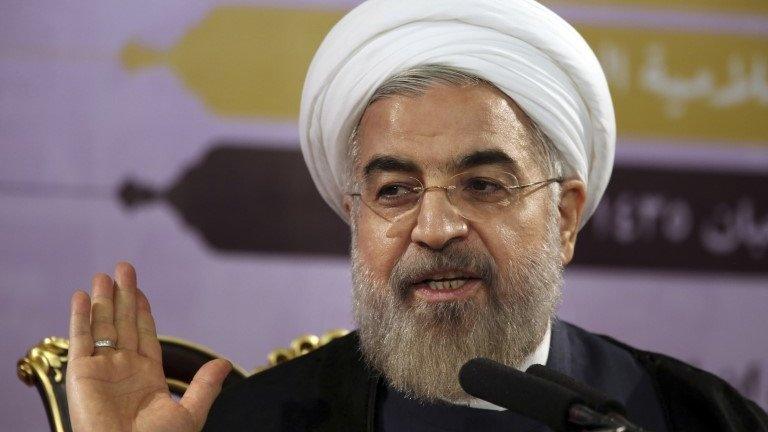
- Published16 June 2014
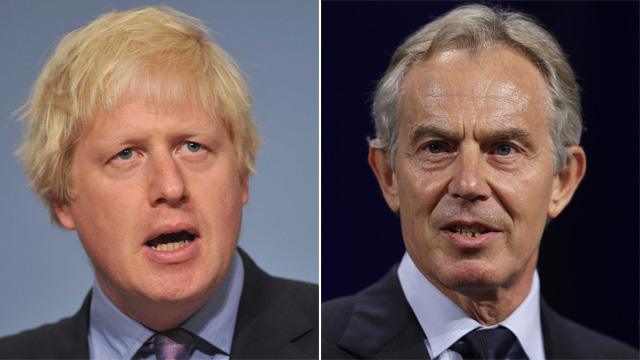
- Published16 June 2014
- Published14 June 2014
